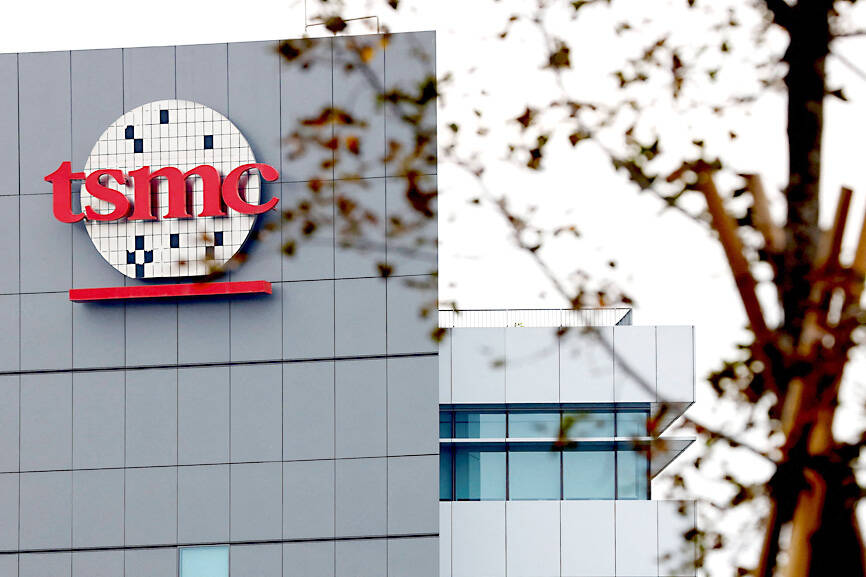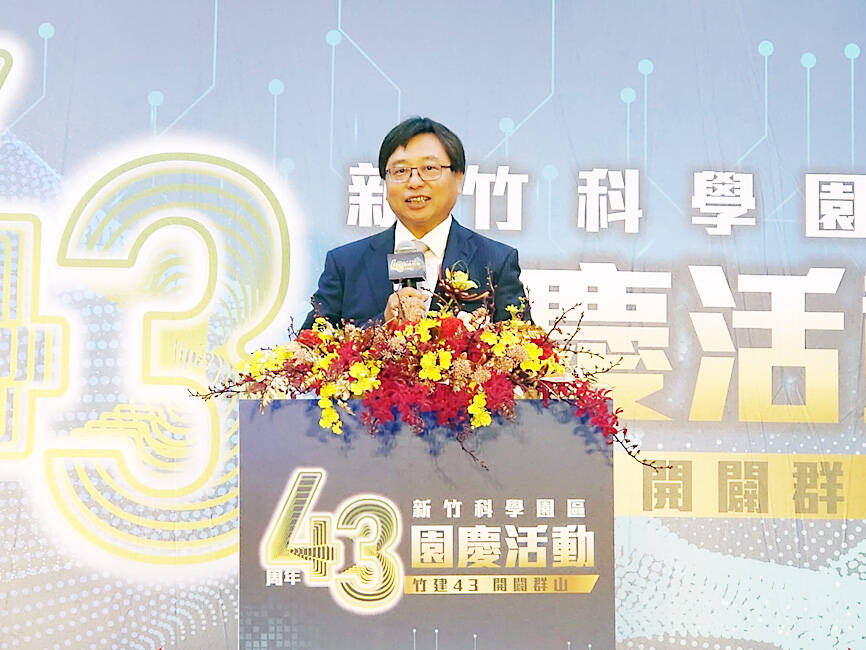Taiwan Semiconductor Manufacturing Co (TSMC, 台積電) is expected to move in the first piece of manufacturing equipment for its first 2-nanometer fab in April, paving the way for the world’s biggest contract chipmaker to start producing 2-nanometer chips in 2025, Hsinchu Science Park (新竹科學園區) Bureau director-general Wayne Wang (王永壯) yesterday said.
TSMC’s 2-nanometer fab is in Hsinchu County’s Baoshan Township (寶山), where the science park administration is working on a second-phase development program, after it completes its first-phase program, where it houses TSMC’s new research and development center, Wang said during a ceremony celebrating the science park’s 43rd anniversary.
The infrastructure construction is proceeding smoothly, he said.

Photo: Reuters, Ann Wang
TSMC’s new 2-nanometer fab construction progress, as Wang described it, indicates that TSMC might be on track to start engineering a pilot run for its 2-nanometer technology next year, before entering a production pilot run and volume production in 2025. The chipmaker said in May that it planned to start building a second 2-nanometer fab next year in Taichung.
However, Taichung Mayor Lu Shiow-yen (盧秀燕) told reporters earlier this week that TSMC could change its mind and consider building a more advanced 1.4-nanometer fab in Taichung, as the chipmaker suffered a setback in securing land to build a 1.4-nanometer fab in the Longtan (龍潭) section of Hsinchu Science Park, amid local protests over government appropriation of privately owned land for industrial use.
TSMC did not comment on whether it has altered its new fab construction plan in Taichung.

Photo: CNA
Separately, Wang told reporters that the production value of manufacturers in Hsinchu Science Park is set to recover to its peak level starting from next year, following a tough period this year when an economic slowdown and geopolitical tensions cut production value by 19 percent annually in the first half of this year to NT$668.4 billion (US$21.38 billion).
As demand returns, the decline has shrunk to about 10 percent, Wang said. He expects the recovery to extend into 2025, fueling explosive growth in production value to a new record high from companies in the park.
Additionally, the science park bureau said that the third building of the biological technology district within the science park would be completed in the second quarter of next year. It cost more than NT$3 billion, it said.
In addition, the first building of the “X” base is to be completed in the near future, Wang said.
The “X” base is designed to be a hub for the development of emerging technologies such as precision healthcare and generative artificial intelligence.

Macronix International Co (旺宏), the world’s biggest NOR flash memory supplier, yesterday said it would spend NT$22 billion (US$699.1 million) on capacity expansion this year to increase its production of mid-to-low-density memory chips as the world’s major memorychip suppliers are phasing out the market. The company said its planned capital expenditures are about 11 times higher than the NT$1.8 billion it spent on new facilities and equipment last year. A majority of this year’s outlay would be allocated to step up capacity of multi-level cell (MLC) NAND flash memory chips, which are used in embedded multimedia cards (eMMC), a managed

CULPRITS: Factors that affected the slip included falling global crude oil prices, wait-and-see consumer attitudes due to US tariffs and a different Lunar New Year holiday schedule Taiwan’s retail sales ended a nine-year growth streak last year, slipping 0.2 percent from a year earlier as uncertainty over US tariff policies affected demand for durable goods, data released on Friday by the Ministry of Economic Affairs showed. Last year’s retail sales totaled NT$4.84 trillion (US$153.27 billion), down about NT$9.5 billion, or 0.2 percent, from 2024. Despite the decline, the figure was still the second-highest annual sales total on record. Ministry statistics department deputy head Chen Yu-fang (陳玉芳) said sales of cars, motorcycles and related products, which accounted for 17.4 percent of total retail rales last year, fell NT$68.1 billion, or

In the wake of strong global demand for AI applications, Taiwan’s export-oriented economy accelerated with the composite index of economic indicators flashing the first “red” light in December for one year, indicating the economy is in booming mode, the National Development Council (NDC) said yesterday. Moreover, the index of leading indicators, which gauges the potential state of the economy over the next six months, also moved higher in December amid growing optimism over the outlook, the NDC said. In December, the index of economic indicators rose one point from a month earlier to 38, at the lower end of the “red” light.

The global server market is expected to grow 12.8 percent annually this year, with artificial intelligence (AI) servers projected to account for 16.5 percent, driven by continued investment in AI infrastructure by major cloud service providers (CSPs), market researcher TrendForce Corp (集邦科技) said yesterday. Global AI server shipments this year are expected to increase 28 percent year-on-year to more than 2.7 million units, driven by sustained demand from CSPs and government sovereign cloud projects, TrendForce analyst Frank Kung (龔明德) told the Taipei Times. Demand for GPU-based AI servers, including Nvidia Corp’s GB and Vera Rubin rack systems, is expected to remain high,